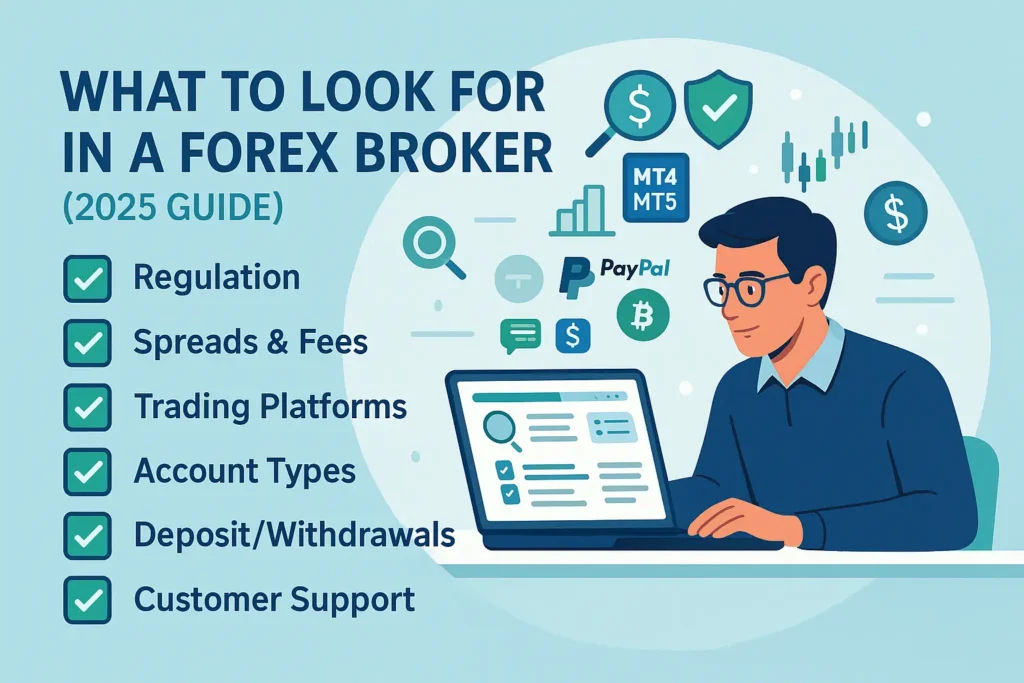What to Look for in a Forex Broker: A Complete Guide for Smart Traders in 2025
Why Choosing the Right Broker Is Crucial
In forex trading, choosing the right forex broker is one of the most important decisions a trader can make. Your broker is not just a platform — it’s your direct gateway to the global currency market. A poor choice of forex broker can lead to unexpected fees, poor trade execution, distorted risk assessments, and even restricted access to your funds. That’s why understanding how to evaluate a forex broker is critical to building a successful trading strategy.
Sadly, the internet is full of brokers that look flashy but operate under zero regulation, charge hidden fees, or delay withdrawals without explanation. On the other hand, a trustworthy broker can provide stable infrastructure, competitive trading conditions, and regulatory protection that allows you to focus on what truly matters — making informed decisions.
So how do you separate marketing hype from real reliability? In this article, we’ll explore exactly what to look for in a forex broker — with real examples, practical insights, and links to trusted sources.

1-Why Choosing the Right Forex Broker Is Crucial for Your Trading Success
The first and most important question you should ask: “Is this broker regulated by a trusted authority?”
A regulated broker is supervised by a financial authority such as:
- FCA (UK) – Financial Conduct Authority
- ASIC (Australia) – Australian Securities and Investments Commission
- CySEC (Cyprus) – Cyprus Securities and Exchange Commission
- NFA (USA) – National Futures Association
These organizations enforce strict rules on capital reserves, client fund segregation, reporting standards, and dispute resolution procedures. For example, brokers regulated in the UK must keep client money in segregated accounts and may offer protection up to £85,000 under the FSCS scheme if the broker collapses.
By contrast, unregulated or offshore brokers (registered in Seychelles, St. Vincent & the Grenadines, etc.) may not follow any such standards. They can delay or deny withdrawals, alter trading conditions, or even disappear overnight — and you’ll have little or no legal recourse.
✅ Tip: Always verify the license on the regulator’s official website — don’t just trust the logo on the broker’s homepage.
📚 Source:
2. Trading Costs: How to Evaluate Spreads, Commissions, and Hidden Fees in a Forex Broker
When choosing a forex broker, understanding the real cost of trading is crucial. Brokers make money in different ways, and if you’re not careful, those small costs can quietly eat away at your profits.
The two most common ways forex brokers charge traders are:
- Spreads – the difference between the buying (ask) and selling (bid) price of a currency pair
- Commissions – fixed fees per trade or per $1 million traded (especially on ECN accounts)
If you’re a day trader or scalper, low spreads are non-negotiable. ECN forex brokers like IC Markets or Pepperstone often advertise raw spreads from 0.0 pips, but they charge a flat commission per lot. On the other hand, some brokers offer zero-commission accounts with higher spreads — which can end up costing more in the long run.
Watch out for hidden trading fees, such as:
- Swap/overnight fees for holding trades overnight
- Inactivity fees for dormant accounts
- Deposit/withdrawal charges, especially with bank wires or e-wallets
🔍 SEO Tip in Action: If you’re searching for the best low-cost forex broker in 2025, always compare both spreads and commissions together — not just one of them.
✅ Pro Tip: Use real-time tools like Myfxbook’s Spread Comparison to see how different forex brokers perform during various market conditions.
3. Platforms and Execution: Your Trading Battlefield
A reliable trading platform is more than a pretty interface. It’s the tool you’ll use to analyze charts, place orders, and manage risk — sometimes within seconds.
Most brokers offer one or more of the following:
- MetaTrader 4 (MT4): the most popular, ideal for beginners and algo traders
- MetaTrader 5 (MT5): newer, with more timeframes and integrated depth-of-market
- cTrader: preferred by advanced traders for its transparency and speed
- Proprietary platforms: often browser-based, but can lack features
What really matters:
- Fast execution with minimal slippage
- Server uptime (99.9% or better is a must)
- One-click trading, customizable charts, technical indicators
- Support for Expert Advisors (EAs) if you use automated strategies
✅ Pro tip: If possible, test the demo account on both desktop and mobile versions. Your trading experience should be consistent and smooth.
📚 Source:
4. Account Types and Flexibility
A good broker offers multiple account types tailored to different levels of experience and risk tolerance. Some common types include:
- Demo Account: risk-free practice with virtual money
- Standard Account: fixed or variable spread, no commission
- ECN/Raw Spread Account: ultra-low spread + commission
- Micro or Cent Account: trades in smaller lot sizes, ideal for low-budget beginners
Other key features to evaluate:
- Minimum deposit (some allow from $10 to $5000+)
- Leverage (regulated brokers often limit this: e.g., 1:30 in Europe, 1:500 offshore)
- Negative balance protection — critical for volatile markets
- Islamic/swap-free accounts, if required for religious compliance
⚠️ Avoid brokers that only offer one “standard” account and push you toward huge deposits without a clear benefit.
5. Payment Systems: Can You Get Your Money Back Easily?
Depositing is usually easy. The real test? Withdrawing.
A trustworthy broker provides:
- Multiple deposit/withdrawal methods: bank transfer, Visa/MasterCard, PayPal, crypto
- No hidden withdrawal fees (or at least clearly stated)
- Reasonable processing times: 24–72 hours is the standard
- Transparent refund policy if funding fails
Some red flags to avoid:
- “Verification delays” used as excuses
- Forced bonuses that block withdrawal until conditions are met
- Crypto-only brokers with no traceable owner or company entity
✅ Best practice: Start with a small deposit. Test both trading conditions and withdrawal before going all-in.
📚 Source:
6-Customer Support and Reputation: How to Know If a Forex Broker Can Be Trusted
In trading, things go wrong — and when they do, you want someone who can actually help.
Evaluate a broker’s support team by:
- Using live chat, email, and phone to ask real questions
- Timing their response speed and depth
- Checking for 24/5 or 24/7 availability
- Seeing if support exists in your native language
Beyond official support, the community matters too. Forums like Reddit’s r/Forex, or Trustpilot reviews, can reveal consistent patterns — delayed withdrawals, spread manipulation during news, etc.
⚠️ Don’t trust a broker just because it has a fancy website. Trust what traders say after 6 months of real use.
7. Promotions, Bonuses, and the “Too Good to Be True” Trap
Many offshore brokers offer no-deposit bonuses, “100% deposit match”, or guaranteed profits — all of which should raise a red flag.
Most regulated brokers don’t offer bonuses at all, because promotions are banned in jurisdictions like the UK and EU to protect traders from misleading expectations.
If a broker dangles huge rewards to join, ask yourself: Why do they need to bait you in?
Instead of chasing bonuses, focus on fair trading conditions. Profits from fake bonuses often require trading 50x your deposit before withdrawal — and that’s if they don’t void it with the fine print.
Conclusion: A Good Broker Supports Your Strategy, Not Blocks It
There’s no such thing as the “perfect” forex broker. Every trader has different needs — some want low spreads, others need fast execution, and beginners may just need a simple interface with good support.
But across all experience levels, the foundation remains the same:
- Regulation over hype
- Clarity over complexity
- Execution over empty promises
Take your time. Read real reviews. Test the platform. And don’t let a bad broker ruin a good strategy.
Because in forex, your broker isn’t just a service provider — it’s your trading partner.
🔍 Final Checklist Before Choosing a Broker
- Is the broker regulated by a tier-1 authority?
- Are fees transparent and reasonable?
- Is the trading platform reliable and fast?
- Does the account type match your skill level?
- Are deposits and withdrawals smooth?
- Is customer support helpful and reachable?
🧠 My Personal Note
As someone who’s worked with both regulated and offshore brokers, I can say this with certainty: you only realize how important a good broker is when something goes wrong — like a spike in slippage during NFP, or a withdrawal delay that ruins your trust.
So don’t trade with a broker just because a YouTuber said so. Read user forums, test the platform, and start small. This article was written based on real industry data, user reviews, and my personal experience building broker comparison tools.
📚 Sources Used
- FCA UK – Register of Regulated Firms
- ASIC License Check
- CySEC – Regulated Entities
- Myfxbook Broker Spread Table
- Forex Peace Army Reviews
- Trustpilot Forex Broker Reviews
Further reading:
– Top Funding Programs
Discover the best prop trading firms offering generous capital, fair rules, and real funding opportunities for serious traders.
– Top Brokers
A curated list of regulated brokers with competitive spreads, fast execution, and trusted reputations in 2025.
– Broker Comparison
Compare spreads, platforms, and trading conditions side-by-side to find the broker that fits your strategy best.

